What is it?
Substance-use disorder comprises a wide variety of behaviors that include, but are not limited to, addiction, excessive usage, and dangerous substance-induced behavior. Children can have alcohol and substance abuse problems even if they aren’t addicted—that is they haven’t developed a tolerance for the substance and don’t show signs of withdrawal if they stop using it. And regardless of the level of usage, substance abuse is considered a serious problem when it interferes with a child’s day-to-day functioning.
What to look for
Parents of children with psychiatric disorders should know that their kids are particularly vulnerable to substance problems. Even normal teenage experimentation can become risky for someone with an anxiety or mood disorder. Use of alcohol or drugs, even when it’s limited, can worsen symptoms of panic attacks, trigger a manic or depressive episode in children with bipolar disorder, and induce psychosis. It is important to know that using substances will also interfere with the efficacy of prescribed medications: The most common reason for anti-depressant medication not working is excessive drinking.
Causes
Diagnosis
Treatment
Other disorders to look out for
Frequently asked questions
While it’s not unusual for teenagers to take a drink or try marijuana, you should be concerned about substance abuse if your child is skipping school, abandoning former interests, using substances before or during school, or concealing alcohol or drugs in his room. Other signs include uncharacteristically poor academic performance and dangerous behaviors such as getting in fights and driving while impaired. You should also be concerned if your child is using drugs that are more physically addictive than alcohol or marijuana, including cocaine, amphetamines, and various other prescription medications.
Is my child okay if he’s not addicted?
Not all children who abuse substances will experience addiction. If substance use seriously disrupts a child’s life and development, it may constitute a substance use disorder.
Will taking prescribed psychotropic medicine make my child more likely to abuse drugs?
No. In fact children with psychiatric conditions who are not receiving medication are more inclined to abuse alcohol and drugs. One study indicates that children medicated for ADHD have their risk for using substances lowered to 50%, which is within the normal population risk.
What causes substance abuse?
Substance abuse can be caused by a variety of environmental and genetic factors. Kids with a family history of addiction are more likely to abuse substances. Children who lack strong family support are also more susceptible, as are children with other psychiatric disorders.
How can I stop my kid from developing a substance problem?
Parental supervision greatly decreases substance use problems. If you are unable to directly supervise your child, consider monitoring his behavior with phone calls at prescribed times. Also be aware that some substances that, unfortunately, are available to teenagers are more likely to become physically addictive than alcohol or marijuana; these include cocaine, amphetamines, and various other prescription medications.
Is substance abuse dangerous?
Substance abuse can be very dangerous because it may lead to hazardous behaviors such as unsafe sex and impaired driving, along with potential addiction. Kids who abuse substances are also more susceptible to developing other psychiatric disorders. Many substances are also considered toxic and should be considered dangerous regardless of usage patterns or behaviors.



